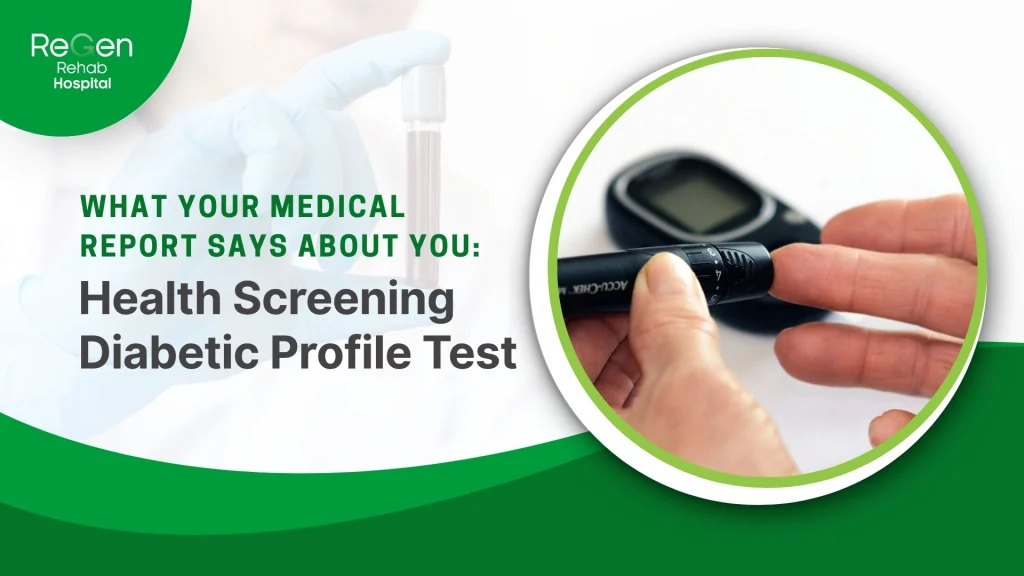Understanding Diabetic Screening: Fasting Glucose & HbA1c Tests
Diabetic screening identifies high blood sugar early, long before complications appear. Taking prompt action can help stabilise glucose levels, reduce stress on vital organs, and lower long-term health risks. These tests provide valuable insights into your metabolic health and help you make informed decisions together with your clinician.
Two key tests are the fasting glucose test and the HbA1c test. Fasting glucose reflects your day-to-day blood sugar levels, while HbA1c shows your average glucose trend over the past 3 months. Using both tests together gives a clearer and more comprehensive picture of your blood sugar control.
What is the Fasting Glucose Test?
The fasting glucose test measures your blood sugar after 8 to 12 hours without food. It assesses how effectively your body regulates glucose for energy. Morning testing is most common, and drinking water is allowed. Poor sleep, stress, or recent illness can temporarily affect results.
If fasting glucose is high, your body may be less responsive to insulin — a common sign of pre-diabetes or diabetes. Your clinician may repeat the test or include additional markers to confirm the pattern.
- Normal range: Below 6.1 mmol/L
- Pre-diabetes: 6.1 – 6.9 mmol/L (Slightly elevated levels, indicating increased risk)
- Diabetes: 7 mmol/L or more (Persistent high levels requiring medical attention)
What is HbA1c and Why is it Important?
HbA1c measures glycated haemoglobin and reflects your average blood sugar levels over the previous 3 months. It is more stable than a single glucose reading and is not affected by one meal or short-term stress.
- Normal range: Below 5.7%
- Pre-diabetes: 5.7% – 6.2%
- Diabetes: Above 6.3%
A high HbA1c indicates sustained high glucose levels, increasing your long-term risk of organ and blood vessel damage. Your clinician may also recommend a fasting glucose or glucose tolerance test for additional clarity.
Health Risks of High HbA1c
Persistent high HbA1c is linked to broader health complications:
- Heart disease and hardened arteries
- Stroke
- Fatty liver disease
- Dementia and cognitive decline
- Hearing loss
- Fatigue and low energy
- Irregular menstrual cycles in women
- Increased cancer risk
- Anxiety and depression
These risks tend to develop gradually over the years. Regular screening, early intervention, and professional guidance can help reduce long-term impact. Consistent lifestyle improvements paired with medical support can significantly lower your overall risk.
Why Diabetic Screening Matters
Diabetes often develops silently, with few or no early symptoms. Timely screening allows early detection, helping to prevent or delay serious complications.
- Detect diabetes early, before complications occur
- Identify pre-diabetes when lifestyle changes can still reverse the trend
- Support ongoing treatment monitoring and adjustment
- Provide a reliable baseline to track your progress over time
Understanding Your Diabetic Profile Test Results
Your diabetic profile report lists key parameters that help assess blood sugar control and overall metabolic health. Values outside the normal range do not always indicate serious condition, factors such as hydration, diet, medications, and recent illness can influence results. Here’s a general reference for common parameters:
Diabetic Profile Test Reference Table
| Parameter | Common Adult Male Range | Common Adult Female Range | Unit | What It Measures |
|---|---|---|---|---|
| Glucose | Normal: < 6.1 Impaired: 6.1 - 6.9 Diabetes: Fasting > 7.0 Random > 11.1 | mmol/L | Measures the amount of sugar (glucose) in your blood. High fasting or random glucose levels may indicate impaired glucose tolerance or diabetes. | |
| Glycated Hb (HbA1c) | Normal: < 5.6 Pre-diabetes: 5.6 - 6.2 Diabetes: > 6.3 Control Target: < 6.5 | % | Reflects your average blood sugar levels over the past 3 months. It helps monitor long-term glucose control and diabetes management. | |
It is important to remember that abnormal results do not always indicate a serious medical condition. Many factors, such as medications, or recent illness, can temporarily influence your diabetic profile test outcomes. Our doctor will consider your overall health, medical history, and other relevant tests to provide an accurate diagnosis and guide the next steps in your care.
Tips for Managing Blood Sugar and Preventing Diabetes
If your test results are elevated, small and practical lifestyle changes can make a meaningful difference. Focus on balanced nutrition, regular movement, and sustainable daily habits.
- Eat more vegetables, lean proteins, and whole grains
- Reduce sugar and refined carbohydrates (white bread, pastries, sweet drinks)
- Stay active — aim for around 150 minutes of moderate exercise weekly
- Maintain a healthy weight to reduce insulin resistance
- Manage stress through yoga, meditation, or deep breathing
- Prioritise quality sleep to support appetite and glucose control
- Limit alcohol consumption and avoid smoking
- Schedule regular check-ups and follow-up testing
Taking Care of Your Metabolic Health
Fasting glucose and HbA1c offer valuable insight into blood sugar control. Early detection empowers you to take positive steps and reduce risk over time. Even small, consistent changes can make a powerful difference. Adopting a balanced diet, staying physically active, managing stress, and getting enough rest all help improve insulin sensitivity and stabilise blood sugar levels.
Now that you understand diabetic screening, it is important to act early. Small, consistent changes make a big difference. Monitoring fasting glucose and HbA1c helps you avoid silent complications such as nerve damage, kidney strain, and vision problems. Regular health screenings provide a clear baseline to track your progress and enable your doctor to personalise your care plan. Take charge of your health today by scheduling your health screening and investing in a healthier future.

